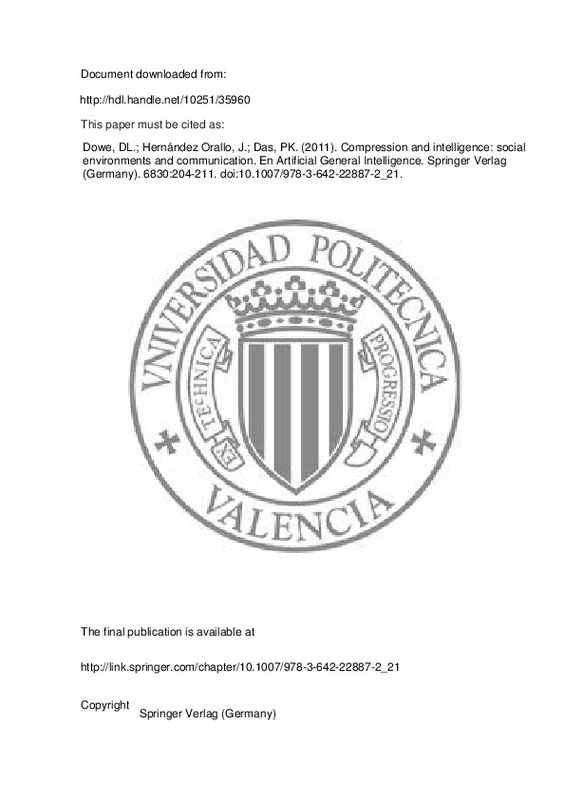Chaitin, G.J.: Godel’s theorem and information. International Journal of Theoretical Physics 21(12), 941–954 (1982)
Dowe, D.L.: Foreword re C. S. Wallace. Computer Journal 51(5), 523–560 (2008); Christopher Stewart WALLACE (1933-2004) memorial special issue
Dowe, D.L.: Minimum Message Length and statistically consistent invariant (objective?) Bayesian probabilistic inference - from (medical) “evidence”. Social Epistemology 22(4), 433–460 (2008)
[+]
Chaitin, G.J.: Godel’s theorem and information. International Journal of Theoretical Physics 21(12), 941–954 (1982)
Dowe, D.L.: Foreword re C. S. Wallace. Computer Journal 51(5), 523–560 (2008); Christopher Stewart WALLACE (1933-2004) memorial special issue
Dowe, D.L.: Minimum Message Length and statistically consistent invariant (objective?) Bayesian probabilistic inference - from (medical) “evidence”. Social Epistemology 22(4), 433–460 (2008)
Dowe, D.L.: MML, hybrid Bayesian network graphical models, statistical consistency, invariance and uniqueness. In: Bandyopadhyay, P.S., Forster, M.R. (eds.) Handbook of the Philosophy of Science. Philosophy of Statistics, vol. 7, pp. 901–982. Elsevier, Amsterdam (2011)
Dowe, D.L., Hajek, A.R.: A computational extension to the Turing Test. Technical Report #97/322, Dept Computer Science, Monash University, Melbourne, Australia, 9 pp (1997)
Dowe, D.L., Hajek, A.R.: A non-behavioural, computational extension to the Turing Test. In: Intl. Conf. on Computational Intelligence & multimedia applications (ICCIMA 1998), Gippsland, Australia, pp. 101–106 (February 1998)
Hernández-Orallo, J.: Beyond the Turing Test. J. Logic, Language & Information 9(4), 447–466 (2000)
Hernández-Orallo, J.: Constructive reinforcement learning. International Journal of Intelligent Systems 15(3), 241–264 (2000)
Hernández-Orallo, J.: On the computational measurement of intelligence factors. In: Meystel, A. (ed.) Performance metrics for intelligent systems workshop, pp. 1–8. National Institute of Standards and Technology, Gaithersburg, MD, U.S.A (2000)
Hernández-Orallo, J., Dowe, D.L.: Measuring universal intelligence: Towards an anytime intelligence test. Artificial Intelligence 174(18), 1508–1539 (2010)
Hernández-Orallo, J., Minaya-Collado, N.: A formal definition of intelligence based on an intensional variant of Kolmogorov complexity. In: Proc. Intl Symposium of Engineering of Intelligent Systems (EIS 1998), pp. 146–163. ICSC Press (1998)
Legg, S., Hutter, M.: Universal intelligence: A definition of machine intelligence. Minds and Machines 17(4), 391–444 (2007)
Lewis, D.K., Shelby-Richardson, J.: Scriven on human unpredictability. Philosophical Studies: An International Journal for Philosophy in the Analytic Tradition 17(5), 69–74 (1966)
Oppy, G., Dowe, D.L.: The Turing Test. In: Zalta, E.N. (ed.) Stanford Encyclopedia of Philosophy, Stanford University, Stanford (2011), http://plato.stanford.edu/entries/turing-test/
Salomon, D., Motta, G., Bryant, D.C.O.N.: Handbook of data compression. Springer-Verlag New York Inc., Heidelberg (2009)
Sanghi, P., Dowe, D.L.: A computer program capable of passing I.Q. tests. In: 4th International Conference on Cognitive Science (and 7th Australasian Society for Cognitive Science Conference), vol. 2, pp. 570–575. Univ. of NSW, Sydney, Australia (July 2003)
Sayood, K.: Introduction to data compression. Morgan Kaufmann, San Francisco (2006)
Scriven, M.: An essential unpredictability in human behavior. In: Wolman, B.B., Nagel, E. (eds.) Scientific Psychology: Principles and Approaches, pp. 411–425. Basic Books (Perseus Books), New York (1965)
Searle, J.R.: Minds, brains and programs. Behavioural and Brain Sciences 3, 417–457 (1980)
Solomonoff, R.J.: A formal theory of inductive inference. Part I. Information and control 7(1), 1–22 (1964)
Sutton, R.S.: Generalization in reinforcement learning: Successful examples using sparse coarse coding. Advances in neural information processing systems, 1038–1044 (1996)
Sutton, R.S., Barto, A.G.: Reinforcement learning: An introduction. The MIT Press, Cambridge (1998)
Turing, A.M.: Computing machinery and intelligence. Mind 59, 433–460 (1950)
Veness, J., Ng, K.S., Hutter, M., Silver, D.: A Monte Carlo AIXI Approximation. Journal of Artificial Intelligence Research, JAIR 40, 95–142 (2011)
Wallace, C.S.: Statistical and Inductive Inference by Minimum Message Length. Springer, Heidelberg (2005)
Wallace, C.S., Boulton, D.M.: An information measure for classification. Computer Journal 11(2), 185–194 (1968)
Wallace, C.S., Dowe, D.L.: Intrinsic classification by MML - the Snob program. In: Proc. 7th Australian Joint Conf. on Artificial Intelligence, pp. 37–44. World Scientific, Singapore (November 1994)
Wallace, C.S., Dowe, D.L.: Minimum message length and Kolmogorov complexity. Computer Journal 42(4), 270–283 (1999); Special issue on Kolmogorov complexity
Wallace, C.S., Dowe, D.L.: MML clustering of multi-state, Poisson, von Mises circular and Gaussian distributions. Statistics and Computing 10, 73–83 (2000)
[-]







![[Cerrado]](/themes/UPV/images/candado.png)


